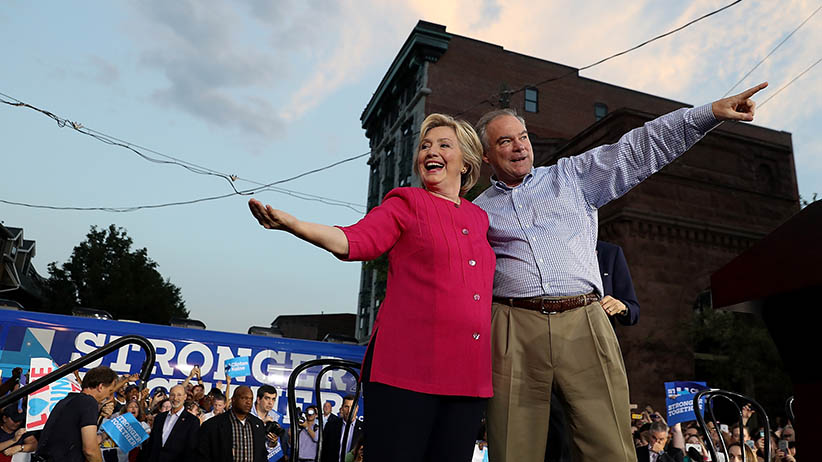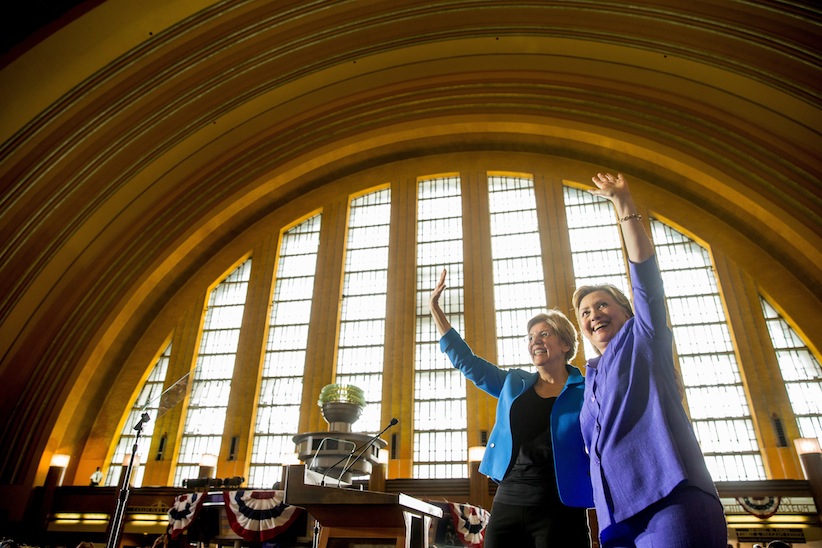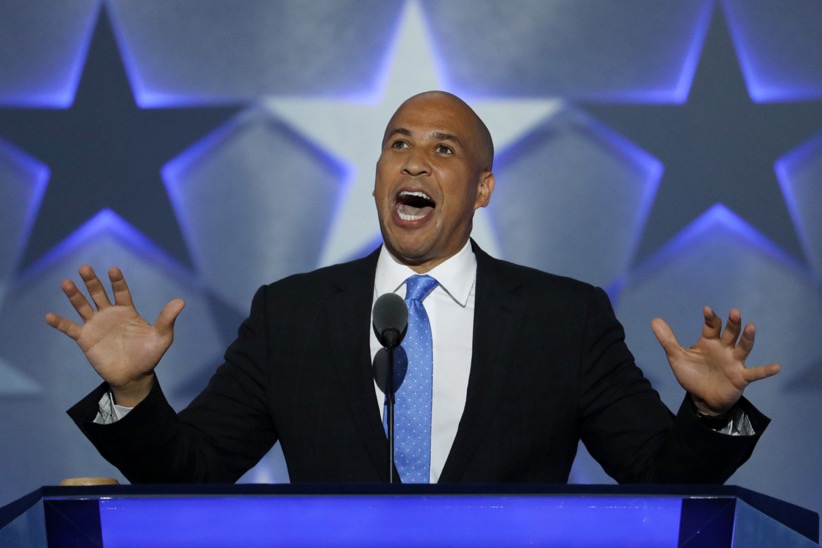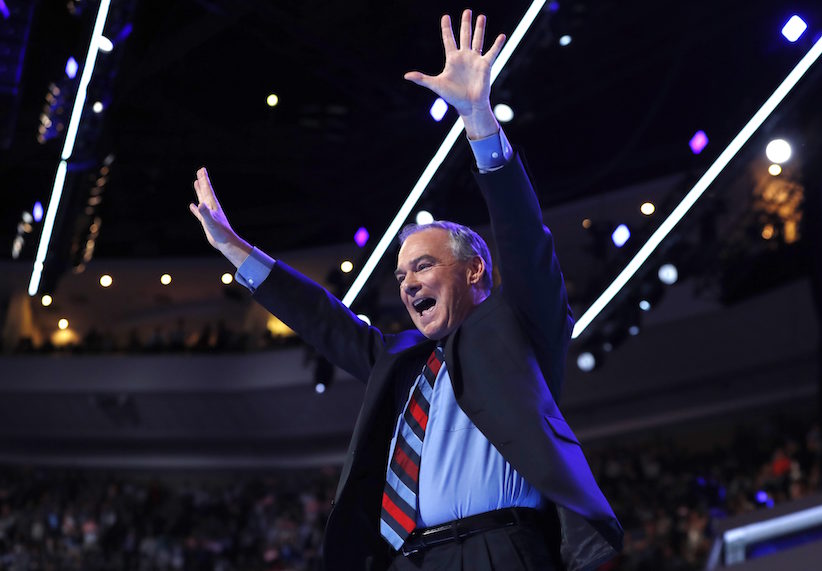Tim Kaine: The running mate who matters
A VP candidate is rarely important. But after Hillary Clinton’s health troubles, Tim Kaine suddenly is.
Democratic presidential nominee former Secretary of State Hillary Clinton and vice presidential nominee U.S. Sen Tim Kaine (D-VA) greet supporters during a campaign rally at Broad Street Market on July 29, 2016 in Harrisburg, Pennsylvania. A day after accepting the democratic presidential and vice presidential nominations at the Democratic National Convention, Hillary Clinton and Tim Kaine are kicking off a three-day bus tour through Pennsylvania and Ohio. (Justin Sullivan/Getty Images)
Share

The macabre mechanics of the American system of government puts the young(ish) man on stage in the old town hall in an odd and awkward spot. He is a highly successful, if unexciting, career politician, the winner of eight out of eight elections at the municipal and state level, campaigning this autumn from coast to coast for a national office that conveys no authority, requires no action, and leaves barely a footnote in history. Yet, should one woman falter, he would become the most powerful person on Earth.
As vice-president John Adams said in 1790, “I am nothing, but I may be everything.”
For Sen. Tim Kaine of Virginia, Hillary Clinton’s running mate, little about the role to which he has agreed to be relegated has changed for the positive in more than 200 years. Few girls or boys dream of growing up to be a nation’s No. 2. Openly slavering for the position is seen as impolitic and self-defeating. Actually holding it for four years—often eight—can be calcifying and dreary. The officeholder since 2009, Joseph Biden, of Delaware, is most famous for saying into an open microphone, upon the enactment of Obamacare, “This is a big f–king deal.”
“I enjoyed my time as vice-president,” smiled Calvin Coolidge. “It never interfered with my mandatory 11 hours of sleep a day.”
The vice-presidency, said John Nance Garner, the 32nd man to fill the office — there have been no women — “is not worth a bucket of warm piss.”
“Once there were two brothers,” said Thomas Marshall, who filled the constitutionally mandated role a century ago. “One ran away to sea; the other was elected vice-president of the United States. And nothing was heard of either of them again.”
And so on. But when Clinton was infected two weeks ago with an aw-shucks-it’s-nothing case of pneumonia in her dehydrated lung, the man she had chosen in July to be her veep suddenly became a person of galactic importance. Pneumonia, after all, kills an average of 53,282 Americans per year. What if Hillary Clinton were to suffer from a more fatal illness in the next four years?
What would happen, according to Article Two of the U.S. Constitution, is that 58-year-old Timothy Michael Kaine—former aid worker in Honduras, former fair-housing lawyer, former mayor of Richmond, former governor of Virginia, and now the state’s junior sitting senator—automatically would become commander-in-chief. What would happen if the 68-year-old Clinton were to expire before Election Day would be up to the Democratic Party.
(None of this applies to the Republicans, whose 70-year-old nominee, though a bit too stout for his doctor’s liking, is immortal, having never been corrupted by nicotine, alcohol, or illicit drugs. Donald Trump’s vice-presidential pick, Gov. Mike Pence of Indiana, has spent much of the past month abnegating and explicating his boss’s most flagrant lies.)
MORE: When Trump met Dr. Oz
With Clinton’s health suddenly a valid national concern—rather than a Fox News/Breitbart delusion—a doctor’s certificate quickly was disseminated that declared Tim Kaine to be “in overall excellent health,” notwithstanding a “history of plantar fasciitis that is inactive,” “mild left atrial enlargement,” “a left mandibular tooth awaiting permanent repair,” and “a 2 x 4 cm subcutaneous cyst on your right costal margin that was unchanged.”
The message was clear: America would be in good hands, God forbid.
Then Clinton returned to the hustings and Kaine vanished again, dispatched to such tier-two metropolises as tidy Exeter in Rockingham County, N.H., where we find a couple of hundred Granite Staters queueing to see him on a Thursday afternoon.
“Whom were you hoping Hillary would pick to be her running mate?” a Maclean’s correspondent asked several of the folks in line.
“A woman,” said one man.
“A man,” said one woman.
“Not him!” said a lady, motioning toward a clapboard stage once trod by Abraham Lincoln, from which Sen. Kaine was about to speak.
“Sen. Elizabeth Warren,” said the next six people in the queue. Warren is the left-wing senator from neighbouring Massachusetts whom Trump has taken to calling “Pocahontas,” an allusion to her (unprovable) assertion on a college application that she is 1/32nd Native American.
“I was hoping for Liz Warren,” said Rose Bryant, sitting in the creaking balcony of the charmingly antique structure. “Our exposure to her is much greater.”
“I was hoping for one of the Castro brothers,” said Pat Breslin, who was standing outside the Exeter Town Hall with a sign that said “Yes we Kaine.” By this, Breslin was not referring to the Communists Fidel and Raúl, but to the Democrats Julián and Joaquín, the twins who are, respectively, the U.S. Secretary of Housing and Urban Development and a member of Congress from San Antonio, Tex.

“Do you agree with John Nance Garner that the vice-presidency is not worth a bucket of warm piss?” a reporter inquired.
“That’s a little harsh,” Breslin replied. “To me, the vice-president is an ambassador who represents the country internationally, and second would be acting as an adviser to the president.”
Breslin seemed untroubled by Clinton’s pulmonary woes. “I had pneumonia and I was in the hospital for 10 days and I’m older than she is!” the Granite Stater said. “Millions of people get pneumonia.”

For more than a year, it commonly was believed among the Washington punditry that Clinton would tap either a Hispanic such as one of the Castro twins, or an African-American such as Sen. Cory Booker of New Jersey, who has been less than shy in labelling Trump “anti-American.”
A month later, however, Clinton tapped Kaine, a white male, like all 47 veeps so far, in the apparent belief that, whatever edge in the black and brown communities a running mate of colour might yield, Trump already was providing that same edge every time he opened his mouth.
Kaine is a reliably mainstream liberal Democrat—with an “F” rating from the National Rifle Association and 100 per cent approval from Planned Parenthood—whose most exciting extracurricular activity is a certain virtuosity on the harmonica. (“I’m boring,” he once confessed on Meet the Press.)
So here is Tim Kaine in Exeter, N.H., telling the crowd in the old town hall, “I had a lot of people asking me today about my inactive case of plantar fasciitis.”
“The race is close,” he admits. “We were absolutely dead heat coming into the first convention in Cleveland. Coming out of the convention in Philadelphia, we actually really got a bump, and you often do that out of a convention. We got a good bump. But then over the last few weeks it’s settled back down.
“I would rather be us right now than them. I think we have a more straightforward path to win and they have a more complicated path, but boy, nothing to take for granted.
“I have run eight races and I have won eight races and I’m not going to lose this one,” Kaine tells the faithful Democrats of New Hampshire, with its four electoral votes. “Never lost a race. But I’ll be honest with you now that I’ve kind of puffed myself up. I do have to be honest: I barely win my races. I’m not a big landslide guy. No, I barely win my races. And I always say to young people, career advice: If you find that you’re a barely likeable-enough person, go into politics. You just need 51 per cent.”

The audience likes this; they are sensing in Kaine someone who could take the Democratic Party into the 2020s, God forbid. He goes on:
“When Hillary Clinton called and asked if I would be her running mate—so this is a call from somebody that President Obama described as the most qualified person to be nominated by a major party in the history of the country—and so when that person says, ‘I want you to be my running mate,’ I started to say yes right away and she said, ‘Wait a minute, I want to tell you why first.’ Oh, okay, I guess I was too anxious, you know?”
In the long history of the vice-presidency of the United States, the enthusiasm of Timothy Michael Kaine may go down as a new record for a high jump over a low bar. As Daniel Webster retorted in 1840, when mooted as a possible VP:
“I do not propose to be buried until I am really dead.”